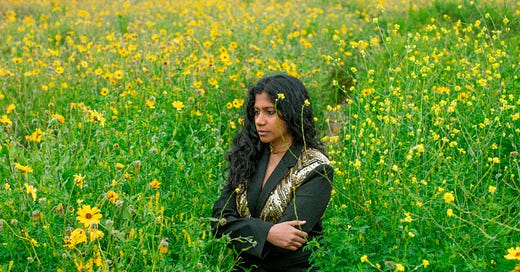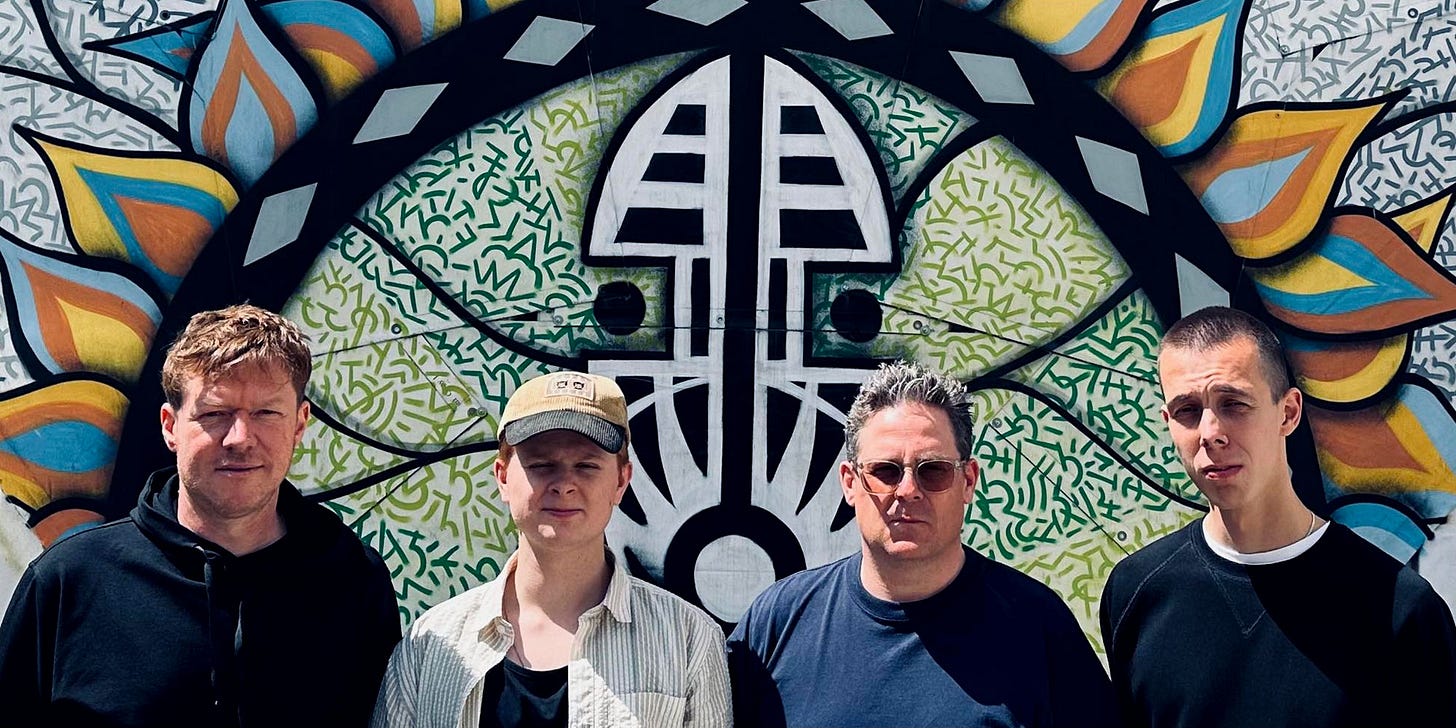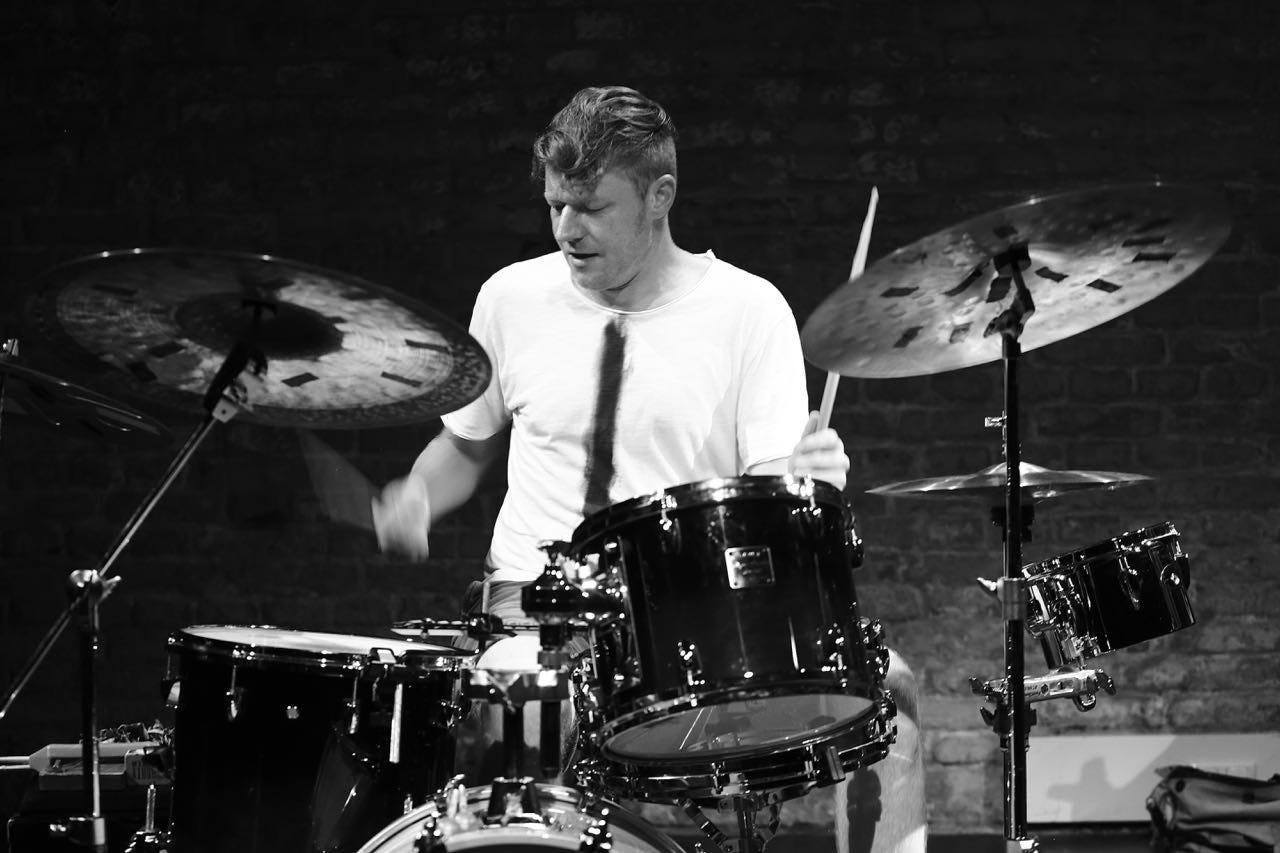Last week was rough. I imagine there will be a mounting pile of rough weeks as the months pass. I’m under no illusion that Democrats will learn from their blunders, and I’m trying my best to resist my hunch that things are gonna get a lot worse, but, damn. It’s hard to have any trust in institutions in these days of late capitalism, when there’s no longer any subtlety about feeding humanity into the wood chipper of profit and “growth.” It’s hard not see this all as a mad dash to cash in and extract maximum value before the planet is reduced to cinders. In these times—and all other times—music offers the best medicine, especially when it’s all about community and collaboration. We need that stuff more than ever.
The Endlessly Mutable Beauty, Grace, and Invention of Ganavya
As part of the 2020 edition of Frequency Festival, the contemporary and experimental music fest I organize in Chicago each February, I presented the duo of percussionist Rajna Swaminathan and singer Ganavya Doraiswamy. The performance—a couple of weeks before Covid brought normal life to a screeching halt—was remarkable, an improvisatory excursion bubbling with the rhythms of Indian classical tradition, but with a meditative beauty and deep soulfulness that transcended any notion of genre. This was pure music of the highest order. At that point in her career Ganavya had only released a single album under own name—Aikyam: Onno, a promising Indo-Jazz recording that, in hindsight, is too restrictive for the singer’s boundless aesthetic. In the years since Ganavya’s stunning voice has turned up on many sublime recordings, including recent albums by guitarist Miles Okazaki and saxophonist Immanuel Wilkins—her contributions to his new album Blues Blood (Blue Note) are particularly powerful. Thankfully, her recording drought has come to an end, and this Friday she releases Daughter of a Temple (Leiter), the second album under own name this year. She performs in Berlin on Sunday, November 17 at Silent Green.
Last year Ganavya did release sister, idea (Ropeadope), a duo album with Brazilian guitarist Musir Hossn that reinforced the remarkable versatility of her voice, thriving in more song-oriented rather than the incantatory, free-flowing style where her melodic invention, mastery of timbre, and hypnotic beauty shine most. And it’s not as if she’s been idle. In recent years she worked on Wayne Shorter and Esperanza Spalding’s opera and continued to collaborate with theater director Peter Sellars, among other projects, but it’s about time we got to spend more time in sound worlds she’s designed, albeit ones that depend on deep collaboration for their realization. Daughter of a Temple is actually the older of her two 2024 albums, made in 2022 at Moores Opera House in Houston, Texas with a stellar cast for what she called “a gathering in and for devotion” in celebration of Alice Coltrane Turiyasangitananda. She invited a broad array of collaborators (including a raft of dancers), friends, and family to participate in the week-long project, in which she celebrated the music and ideas of Alice and John Coltrane in her own distinctive fashion. It’s less of a deliberate recording project than a focused document of the endeavor. The album opens with “A Love Chant,” an otherworldly 42-second a cappella duet with Spalding, taken from the middle of a concert, in which their voices project hushed power, feathers hitting like anvils, as they offer variations on the phrase “A Love Supreme.” That masterwork is also referenced in “Om Supreme,” which opens with an extended solo from pianist Vijay Iyer and then moves onto a kind of sung rationale for the gathering, with soulful commentary to her words provided by the gorgeous alto saxophone playing of Wilkins. Acoustic guitar arpeggios, sitar lines (played by AACM fixture Shanta Nurullah), and the airy flutes of Shabaka Hutchings limn her voice on the delicate “Prima Muditha,” which you can hear below.
The album then pivots more directly into the music of the Coltranes, including a wide open reading of Turiyasangitananda’s classic “A Journey into Satchidananda” and an improvised account of the four movements of “A Love Supreme,” with dedications to Wadada Leo Smith and Alice Coltrane, and key contributions from Sellars and IONE. Ganavya elides any single tradition or approach, and the recording captures a palpable community spirit that seems to have characterized the project. While many efforts in this vein can easily slide into cringey new age posturing, Ganavya’s music always feels genuine, undergirded with such strong musicality, improvisational edge, and internal communication that even the most florid passages convey some sense of human complexity. Ganavya made her UK debut as a guest for the first live show by the acclaimed experimental soul juggernaut Sault in 2023, where she extended her London connections beyond Hutchings, who produced and released her fantastic like the sky, I’ve been too quiet (Native Rebel) back in March. As much as I enjoy the tranquility of Daughter, I feel like the earlier recording gets at the singer’s range and essence more effectively, demonstrating the elusive mix of weightlessness, agility, and lyricism that emanate from her being with deceptive ease. She’s one of those vocalists who can sing anything and make it work. The clarity she brings to some of the songs on the duo record with Hossn occurs within direct, pop-oriented excursions, and her precision and grace make it all work, but without such strictures her instrument can really take off. The album, which features a support cast including Leafcutter John, Tom Herbert, and Floating Points, resides in a hazy ambient atmosphere, but as drifty as her voice can get, caressing and pouring into the arrangements like a liquid, it’s never aimless or mushy. The arrangements are lean, creating a space with gurgling electronics on one side and cycling harp arpeggios and exploratory reeds on the other, proffering decidedly unobtrusive settings for her majestic singing, which needs little help. Below you can hear the closing track, “I walk again, eyes toward the sky,” which features some lean arco bass, twangy harp lines, and bass-heavy, wordless vocal line circling behind Ganavya’s incredible motivic exploration. Her PR team wasn’t able to confirm which musicians will join her in Berlin, but the instrumentation will only include bass and harp, an ideal framing of her voic
Freebop Ahoy! with Kaiser Pommes and Oliwood
It’s no secret that Berlin is a magnet for creative musicians from all over the globe, but particularly for players from Europe. Every week I seem to discover that another fiery improviser is actually based here. Kaiser Pommes is an agile post-bop quartet that includes three Danish players working with German drummer Oliver Steidle, and when I began reading some background info I discovered that three of its four members live in Berlin. I was well aware that alto saxophonist Asger Nissen lived here. I first learned about him through his membership in drummer Jim Black’s energetic quartet called the Schrimps, but since then I’ve heard him in a variety of contexts, including his quartet Nissen Mosh, which released a strong album called Precious on Enja last year. That group’s bassist is Thorbjørn Stefansson, the Dane who plays in Kaiser Pommes. I just discovered he’s lived in Berlin since 2019. Kaiser Pommes trumpeter Kasper Tranberg still lives in Copenhagen, and considering his stature in Denmark I’m guessing he has no plans to join his bandmates here.
The group debuted at the 2023 edition of the Copenhagen Jazz Festival and I missed the group’s Berlin performance back in May, but this Friday, November 15 they perform at Donau115 in support of a sturdy debut album for ILK Music, which focuses mostly on the quartet’s feverish rapport and interplay. Nissen and Tranberg each wrote some tunes, but half of the album’s dozen tracks are credited to the group—a variety of duos, super short gestures, and form-finding excursions. I wouldn’t have deduced that without looking at the credits. Steidle and Stefansson produce shape-shifting grooves that perpetually propel, trip up, and caress the braided frontline horns. On the album’s opening tune, Nissen’s “Libitum,” the loping unison horn melodies don’t necessarily direct traffic, but instead seem to float over the rhythm section’s adroit, often knotty thrum. The following piece, “Pommes Dual” is a short, improvised joust between Steidle and Stefansson that highlights their strong connection. It's easy to imagine the pair, smiling and laughing, as they drill down into tricky polyrhythms, splintering and reshaping spontaneous patterns with giddy enthusiasm. That vibe endures across the whole record, on both improvised and composed material, egging Nissen and Tranberg on to ever greater heights. On Nissen’s ballad “AboveWithin” there’s a simmering calm on the brink of disruptive turbulence. The horns cascade in lines that keep changing in length, phrase, and articulation in the opening minute, and the way the bassist threads the time-spreading approach of the drummer brings a fraught tension. The horns trade solos across the performance, as if walking the halting groove’s tightrope, and even when they coalesce toward the end I half expected everything to explode rather than to wind down suddenly. Check it out below. I’m also fond of Tranberg’s tune “Rouleur,” especially after Stefansson switches the feel to a driving line that ratchets up the energy in a thrilling, unexpected way.
Although Steidle, the lone German in the band, has a few steady working projects, he’s a serial collaborator, working with all sorts of players in all sorts of styles. In fact, his project Oliwood is designed to cycle through new personnel on a regular bassist. In August the latest iteration of the group—with trumpeter Peter Evans, clarinetist Rudi Mahall, and double bassist Robert Landfermann—released Anatomy of Anarchy (Jazzwerkstatt), which, like Kaiser Pommes, blends tunes by individual members and group improvisations. While Steidle has a thing for modern fusion, melding funk and electronic music with improvisation in his band Killing Popes, and veering towards rock in the collective Rokc Music (duh!), the current iteration of Oliwood centers on free jazz, more or less. Steidle’s personnel decisions are the starting point, a move that really determines how things will go. These monster players are all forceful improvisers game for any challenge while simultaneously cognizant of how to function within an ensemble without surrendering their personalities. The album begins with “Right as Rain,” a Landfermann theme with a tricky, corkscrewing melody and a taut arrangement that seems more focused on inspiring febrile improvisation than delivering an earworm. Mahall quickly seizes control with a typically wide-ranging bass clarinet solo. But after a few minutes the bassist throws down a gauntlet, picking up his bow and unleashing something much more extroverted, muscular, and strident than his fleet pizzicato playing. In a jiffy, he changes the contours of the performance. He does something similar on the following piece, a Mahall composition called “Ich Stand im Stau,” flitting between a walking bass line, post-William Parker fury, and blues rightness, sometimes bar by bar.
Three of the album’s nine pieces are group improvisations, and these really allow us to hear the quartet operating in a collective sense. On “Meditation on a Slaughterhouse” a low-key gesture by Evans seems to organize the performance in real-time, as the others assemble a puzzle-like construction around a series of repeated phrases and lines, constantly rejiggered and reordered as things progress, with quicksilver responses and jabs that keep everything moving like a flash. A high-powered swing vibe arises on the fleet Evans tune “Freaks,” highlighting the ensemble’s virtuosity. As usual, the trumpeter’s solo is impossibly fast and technically flawless, riding over the form like a slot car, but Mahall ably follows suit with his more unwieldy instrument. That leads straight into Steidle’s “Bling Bling Frogs,” another high velocity stormer where the rhythm section goes to town, swinging furiously with all kinds of displacements and accents, while the horn players shred, ripping solos larded with sly quotes and fleet, mind-melting technique. Check it out below.
Recommended Shows in Berlin This Week
November 12: Joseph Houston, piano, plays Bryn Harrison’s Vessels; Felicity Mangan, electronics, 8:30 PM, KM28, Karl Marx Straße 28, 12043 Berlin
November 13: Laetitia Sadier, 8 PM, Kantine am Berghain, Am Wriezener Bahnhof, 10243 Berlin
November 13: Marmalsana (Maurice Louca, microtonal acoustic guitar, Tony Elieh, acoustic bass guitar, and, Burkhard Beins, percussion), 8:30 PM, Sowieso, Weisestraße 24, 12049 Berlin
November 14: Volker Meitz, synthesizer, with Silke Eberhard, alto saxophone, and Taiko Saito, vibraphone, 8:30 PM, Donau115, Donaustraße 115, 12043 Berlin
November 15: Hossein Alizadeh & Hamavayan Ensemble (Hossein Alizadeh, tar, Zohre Gholipour, vocals, Parisa Pooladian, rubāb, Saba Alizadeh kamāncheh, Mehdi Emami vocals, Houshmand Ebadi, ney, Ali Boustan, setar), with guest Behnam Samani, daf and tombak, 8 PM, Philharmonie Berlin, chamber music hall, Herbert-von-Karajan-Straße 1, 10785 Berlin
November 15: Liliane Chlela; White Boy Scream, 8 PM, Betonhalle, Silent Green, Gerichtstraße 35, 13347 Berlin
November 15: Harmonic Space Orchestra: Prime Time #7: M.O. Abbott, bass trombone, Ellen Arkbro, trumpet, Judith Hamann, cello, Jonathan Heilbron, contrabass, Rebecca Lane, quarter-tone flutes, Thomas Nicholson, viola, Michiko Ogawa, bass clarinet, and Lucy Railton, cello (Elsie Hamilton, James Tenney, Ellen Arkbro, and Thomas Nicholson), 8:30 PM, KM28, Karl Marx Straße 28, 12043 Berlin
November 15: Kaiser Pommes (Kasper Tranberg, trumpet, Asger Nissen, alto saxophone, Thorbjørn Stefansson, double bass, Oliver Steidle, drums), 8:30 PM, Donau115, Donaustraße 115, 12043 Berlin
November 15: Jeremy Pelt Quintet (Jeremy Pelt, trumpet, Jalen Baker, vibraphone, Misha Mendelko, guitar, Leighton Harrell, bass, and Jared Spears, drums), 9 PM, Zig-Zag Jazz Club, Hauptstraße 89, 12159 Berlin
November 16: Angelika Niescier, alto saxophone, and Aki Takase, piano, 8:30 PM, Sowieso, Weisestraße 24, 12049 Berlin
November 16: Erik Drescher, flute, and Susanne Zapf, violin, play Luigi Nono (Das atmende Klarsein (Fragment), for bass flute, tape and electronics; La lontananza nostalgica utopica futura. Madrigale per più „caminantes“ con Gidon Kremer, for violin solo, 8 tapes, 8 to 10 music stands), 9 PM, KlangWerkstatt Berlin Festival for New Music, Kunstquartier Bethanien, Studio 1, Mariannenplatz 2, 10997 Berlin
November 16: Or Bareket Quartet (Or Bareket, double bass, Godwin Lewis, alto saxophone, Jeremy Corren, piano, and Savannah Harris, drums), 9 PM, Zig-Zag Jazz Club, Hauptstraße 89, 12159 Berlin
November 17: Ganavya, 8 PM, Kuppelhalle, Silent Green, Gerichtstraße 35, 13347 Berlin
November 17: Savina Yannatou & Salonico Trio (Savina Yannatou, vocals, Kostas Vamvalos, qanun, accordion, Harris Lambrakis, ney, Dine Doneff, bass), 9 PM, Zig-Zag Jazz Club, Hauptstraße 89, 12159 Berlin






